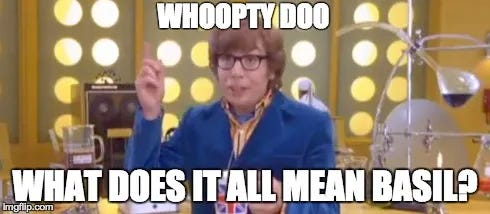The Surprising Place to Start If You Want to Change the World
Why Empathy for My Insufferable Neighbor Isn’t About Being Nice
The metaphor of a moral ledger. The idea of yourself as a lifelong architect. Turning boats, ripples on water, credits, debits…
If you are diving into this Substack based on the rad logo and idea that Empathy as Rebellion sounds punk rock you might be thinking like one eminent expert on culture, Austin Danger Powers.
“Whooptydoo. But what does it all mean Basil?”
Well, you see, *clears throat*, “Imagine a room, a study. It is well appointed. A fireplace gently crackles. In the center of the room stands a writing desk. There are two items there. A pen, and a ledger…”
Yes, yes, yes… I got it. You have a room that you want to be sitting next door to Plato’s cave. Maybe visited by Descartes’s Demon? You’re embracing the poetic side of philosophy, the least empirical of all fields of study. But what is the point? And before you say, “you can be better tomorrow,” that I get.
But how does this help me tonight when I’m talking to Dave from down the street when we pick up our kids from sportsball practice? Sure, he’s lost 60 pounds in four months.
With Ozempic.
Now he’s acting like he’s some kind of fitness guru and he shed every ounce through sheer force of will and now he can run an 8:00 minute mile and he’s giving me crap about how he’s going to beat me in the Turkey Trot at Thanksgiving when we all know he wouldn’t have made it jogging a block last year and now he’s decided the quarterback on the regional football team where he grew up is better than my quarterback from the regional football team where I grew up… Dave used to be a good guy, but now he’s kind of a dick.
How does your architect and his moral ledger help me deal with Dave?
Well… maybe you need to reframe how you see Dave? It sounds like dealing with him is causing some irritation in the soul.
Wait… I need to “reframe how I see Dave”? He’s not some homeless guy in front of the Starbucks. He’s doing fine. Trust me. I know. He’s told me. He got that promotion that came with an office and he brags about it even though he works most days from home. When I see this guy waiting for our kids to get done with practice.
Dave used to be cool. Before taking the big O. Now that he’s lost 60 pounds he’s acting like some holier than thou asshole.
And I should be rethinking my mentality about him, when I’ve put in time to try to create an actual relationship with yet he’s the one that sucks? It’s all I can do to not ignore him altogether or stop biting my tongue and call him out on his crap. I have neither the mental energy nor bandwidth to put that much effort into the guy.
And yet here we are… taking up your bandwidth… talking about the guy. Face it, Dave is a part of the community you live in. You are going to be interacting with him no matter how much you’d rather not. Wouldn’t it be better to be pleasant in your head rather than seething?
If you are going to tell me to be nice to a guy who needs nothing from me because he’s got it all figured out… I’m out. I thought this was philosophy. I get empathy for the people beneath me… not for the people who act like I’m beneath them.
Why “Be Nice” Isn’t the Point
You’re right. If all I was saying was ‘be nice,’ I’d be wasting both our time. ‘Be nice’ is easy, if you have infinite patience and no real feelings.
What I’m saying is: your real feelings, your effort, your resentment? They’re raw material. What you do with them is the actual architecture of who you’re becoming, whether you want to be or not. Why do you want to engage with these ideas anyway?
Because the world sucks and I want hope that it will get better.
Then maybe we need to start with Dave before you even think about the guy in front of Starbucks.
But Dave sucks. He doesn’t need anything from me.
Are you sure about that? Everyone needs affirmation, a feeling that they value. No one makes the effort, and yes, even using Ozempic it requires effort, to lose 60 pounds in four months and start running 5K’s for nothing. In addition to the health benefits, there is a way that it reframes one’s sense of self within their community.
Maybe Dave has felt lesser than around you for all this time, and now that he has something to be proud of he wants you to notice.
Maybe he felt to you like a convenient yardstick, one you could look at and think, “yeah, I’m out of shape, but at least I’m not Dave.”
That’s no judgement on you, by the way. We all do that, and it can alter the way we view ourselves when that external measure fundamentally changes.
Everyone Needs Something
I’m not here to tell you that you need to suddenly see Dave as a saint and only think of him as sunshine and rainbows. But regardless of you seeing him as not worth the energy to change how you think, that’s where you are wrong.
Again bro, What. Is. The. Point? Is Dave secretly your cousin or something?
The point isn’t about Dave. The point is that this is where you build the muscle memory for every bigger, more meaningful act of empathy and justice you hope to perform. The self you’re building in this petty moment is the same self you bring to the next crisis, the next moral crossroads, the next chance to make the world less terrible.
The Muscle Memory of Empathy
A major component of architectural humanism and ledger ethics is intentionality. Most people become who they are by accident. They build by default, by habit, by never questioning the small ways they react to their world. Intentionality is rebellion. Rebellion against the person you’re becoming without realizing it.
You interact with Dave. He’s going to trigger thoughts. Why not be intentional about them? After all, they affect you no matter if you put effort towards them or not.
Every time you mess up and resent Dave is not just a loss; it’s feedback. You track it in your ledger. You see the pattern. You use it next time. That’s the real practice.
And to the sentiment that the world sucks and I want hope that it will get better, think of that idea like a goal to run a marathon.
Right now, you can run a 5K. That’s where you are with empathy and kindness to the guy sitting in front of a Starbucks. Daily reshaping of your thoughts about the people who may normally pass beneath your notice. It’s easy to want to be kind to them once you develop your empathy.
But building a better world, one that changes systems and societies and not just individual interactions, requires greater strength and endurance. Like running a marathon versus running a 5K.
You may not want to expend the energy and bandwidth on changing how you think about Dave. Just like you don’t want to expend the energy to go for the 5-mile training run when its unpleasant outside. But both of those are important to building strength, endurance, and muscle memory to attain the bigger goal.
Dave may be insufferable… but why? Maybe he just wants you to see him as an equal, when subtly you have been treating him as lesser than. You may not have noticed, but he did. And now he has not only improved his health, but his confidence. He wants you to affirm him as an equal, to validate all of his effort to change himself. That’s pretty damned human. Even if he’s annoying with how he talks about Keto.
You are going to be interacting with him one way or another. Instead of thinking about how much you want to call him out for his BS, what if you give him the validation he craves? What if instead of the bitterness inside you that is only corrosive, you exchanged it for joy in another person improving their life?
Training for the Marathon
Because like planning to run a marathon, we don’t get to a better world unless we train with intentionality. But also, like any training plan, understand you are going to fall short sometimes.
After a long week at work, you may not be able to help but to get annoyed at Dave’s insistence that his quarterback, whom he roots for ultimately arbitrary reasons, is better than your quarterback, whose support you provide through no more intention than Dave. That’s ok. You’re human.
But in the larger picture, learning to intentionally reframe how you think about Dave is foundational strength building, just like a five-mile run is foundational to a marathon training plan. To get to the big goal, you need to build up with the little things.
To build up to systemic change, we are going to have to work with a lot of Dave’s. And Karen’s. And people who fail not in moral ways, but in those little social ways that just climb under our skin. Not all of us are charming enough to compensate for our insufferable idiosyncrasies.
We can’t run a marathon if we can’t be bothered to run five miles. Likewise, we can’t build a better, kinder, more empathetic world if we can’t strengthen our grace, kindness, and empathy for that annoying neighbor.
The Work of Being Better
Being better tomorrow doesn’t just happen.
It must be chosen. It must be intentional. You have to put in the work.
Sometimes it does feel pointless to bother. Sometimes Dave really is a dick, and that’s the end of it. The work is choosing, again and again, not because the outcome is guaranteed, but because the act itself shapes you. Not every training run is a PR. But you go out anyway.
The goal isn’t to be seen as nice, or even to make Dave’s day. The goal is to build the kind of internal coherence that makes you capable of real, risky, inconvenient empathy when the world actually needs it.
So analyze how you think about Dave. Understand why you think the way you do. And exercise your empathy and reason to give you the strength and endurance you need.
The strength and endurance to be better tomorrow.
If you're ready to explore practical philosophy for everyday ethical decisions,
without the academic jargon,
subscribe to Radical Kindness: Empathy as Rebellion. Every week, I share frameworks for navigating moral complexity, personal stories of growth through adversity, and tools for building a more ethical life. Join the growing number of thoughtful readers who are figuring out how to be good humans in a complicated world.




